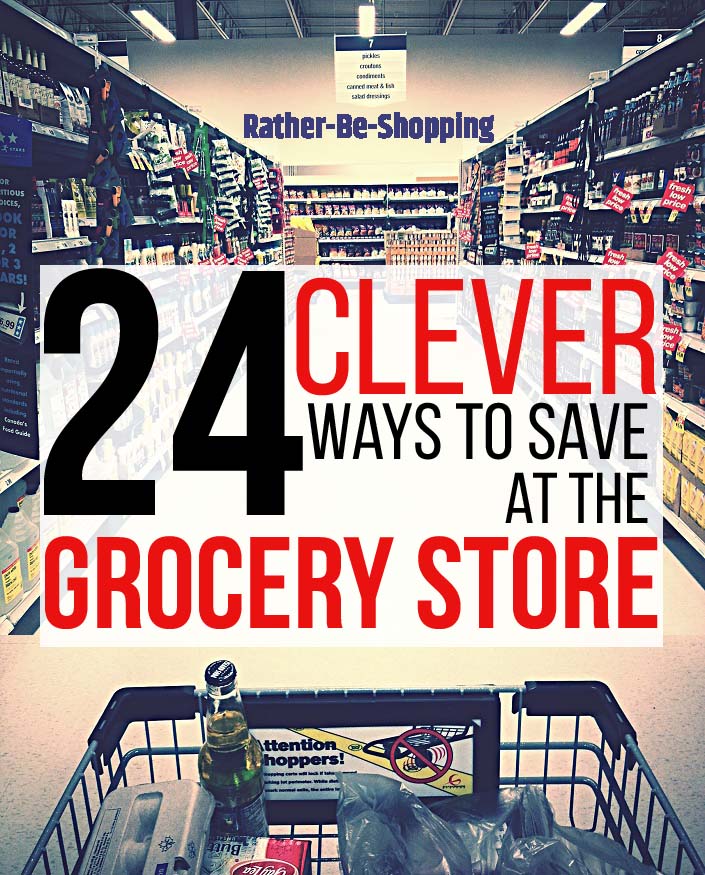Highly Clever Tricks to Save Money at the Grocery Store
Studies show that you’re going to spend between 5 and 6 percent of your income on groceries across the course of your life. Since the average American spends a total of about $4 million between graduating high school and…well…graduating from life itself, that means you’ll burn through $200,000 to $250,000 of grocery money in your life. Fortunately, these 24 clever tips will help you save big on your next trip to the grocery store.

Work the Edges
The most nutritious and best value foods are on the perimeter of the store: your fruits and veggies, dairy, unprocessed meats, etc.
If you spend more than half your time in the center aisles, check your list and make some changes.
My wife will actually “shop backwards” and start her shopping in the back aisle and work her way to the front.
Often, staples like dairy, meats, and bread are at the back, so you’ll end up filling your cart with necessities before reaching impulse buy areas near the front of the store.
Shop Online for Non-Food Items
When I say non-food items, I mean things like cleaning supplies, paper products, shampoo, soap, and Ziploc bags.
Grocery store “pricers” know you’re willing to pay a little more to not make another stop, and they charge you a lot more for the convenience.
Use Amazon, Walmart.com or another online platform to save as much as 50% on those items.
See Also: Amazon Coupons: Where To Find Them and Hacks for Success
Choose Ugly Produce
Many grocery stores offer discounts on produce that is perfectly edible but might not look as appealing (often called “ugly” produce).
Seek these items out as they’re typically cheaper and just as good in terms of taste and nutrition.
Buy Staples All at Once…On Sale
Fill your pantry with canned goods, dry staples like rice and pasta, and storables like breakfast cereal and soda.
A little planning can give you a good idea of how much you’ll need for a 12-week stint, then buy it all the next time it’s on sale.
Shop on a Wednesday
Wednesdays are when many grocery stores discount items that aren’t moving, but still honor the sales from the previous week.
So you can save on two different sets of items.
Note we said “many.” Confirm this, but shop on Tuesday or Thursday if you find your store differs from the trend.
See Also: What Day to Shop? 12 Insider Tips on Store Markdowns
Double-Check the Bulk Options
After spending the 80s and 90s getting us used to the idea of paying less per ounce of food for larger packages, grocery stores now often make the bulk packages cost more per ounce than the same amount bought in smaller boxes.
Use a calculator, or check the price per unit note on the tag before buying.
In fact, Kiplinger has put together a list of the worst goods to buy in bulk.
See Also: Costco Hack: How to REALLY Buy in Bulk and Save Money
Late at Night or Early Morning Hack
Shopping during these times can give you access to markdowns that are applied before the store closes or right after it opens, especially on perishable goods.
As I’ve discussed before, Walmart is notorious for this, especially when it comes to meats and bakery items.
Shop With a List
Shopping with a list (and sticking to it) can reduce up to 65% from your grocery bill by helping you avoid impulse buys.
Having a written list doesn’t just protect you from extra purchases.
It saves you from making extra trips because you won’t forget a vital ingredient.
Buy Low, Buy High
Because grocery stockers know how tall average people are, they put the most expensive options at eye level.
Look above and below those options and you’ll often find equivalent choices at 20-40 percent lower prices.
Buy Frozen Seafood
The fresh seafood on ice is almost always just stuff taken from the freezer and marked up by as much as 40%.
Besides, frozen shrimp is still good by the time you get it home, unlike fresh seafood purchases that will be much closer to room temperature when you finally get it in the fridge.
Use Couponing Apps
Coupons are great, but they’re a hassle. Apps like Ibotta and Fetch take the hard parts out and just reduce your cost at the register.
We like Ibotta best as it lets you score rebates on generics like milk, produce, bread and eggs. Plus it works at any grocery store, even your local Ma and Pa corner store.
They even have a $10 sign-up bonus that they’ll give you after you redeem your first grocery rebate.
Also, be sure to check out Fetch as it’ll pay you to simply scan your receipt after you’ve unpacked all your groceries.
See Also: Fetch Rewards Review: Here’s How to Use it to Save BIG at the Grocery Store
Plate Your Portions
Studies show that you eat more if you sit down at a table with an empty plate and serving dishes, as compared to receiving a plate with the portions already meted out.
You save money on groceries and slim down at the same time.
Do Your Own Work…
Don’t buy peeled carrots, portioned oranges, premixed pancake batter, and other convenience foods. They cost far more compared to the raw ingredients than the extra labor justifies.
They’re also more likely to include chemical preservatives, colorants, and enhancers.
…Except at the Butcher Counter
Have the butcher cut your meat to the sizes, portions, and specifications you want. This saves you as compared to picking up the pre-cut slabs on styrofoam in two ways.
First, the cuts are often a few cents per pound less expensive.
Second, you’re buying only as much as you need. No rounding up because that’s the only size in the cooler that day.
See Also: 7 Genius Costco Bakery Hacks That Will Save You Money and Time
Shop in the Afternoon (and just before closing)
Many grocery stores change their prices throughout the day, jacking them up when the harried professionals are on their way home from work, for example.
You can usually get the best deals at mid-afternoon and before closing, but do a little research. Some shops work on a different rotation.
Have Dinner for Lunch
Make enough food at dinner time and pack it for lunch the following day.
Buying enough ingredients for that will save you big as compared to also buying lunch foods.
Especially if you work a job where going out to lunch is the norm.
Get a Little Puritan (and Vegetarian)
The two most expensive items on your weekly grocery bill will be alcohol and meat.
Try cutting your alcohol consumption by a night or two a week, and adding two vegetarian meals into your rotation. Then watch your grocery budget shrink.
Investigate Grocery Delivery
Oddly enough, some grocery delivery services can save you money. You become instantly immune to impulse buying. You often automatically qualify for store rewards.
Online deals are easy to take advantage of, and you use less gas. This doesn’t always pencil out with every service, but look into it.
Use a Smaller Cart
When grocery stores increased the size of their carts, sales went up by 40%.
Use those little carts to help keep yourself on track for buying less.
Check Different Locations
If an item you need is in different parts of the store, look at them both.
Sometimes, sesame seeds in the Asian aisle cost more than the same exact product over in bulk foods or baking. Weird, but true.
Shop With Cash
Study after study has proven that we buy less if we use cash. Between 15 and 40% less depending on the study
Run that math against the statistics we opened this article with.
Forty percent of a quarter million dollars is more than many of us make in a year.
Store it Smart
We throw away as much as 40% of what we eat. Storing our perishable foods the right way can cut that amount way down.
You’ll need to research the best practices for your favorite perishables, but it’s worth the time and effort.
See Also: The 14 Cheapest Grocery Stores Near You That’ll Save You Big
Shop Rarely
Each trip to the grocery store is another opportunity to impulse buy (plus expenditure of gas and time).
If you can get it together to shop just every other week, do it.
If not, one trip a week should be your absolute maximum.
Know the Bottom Price
Keep a shopping journal for several months until you’ve identified the lowest prices your store will charge for various items.
Whenever possible, wait to buy those groceries until they’re at or very near that bottom price.
This takes some longer-range planning, but it’s usually worth it.
Chew Gum
Every single one of us has deviated from our list out of temptation from the bakery, or freshly barbecuing ribs, or some other succulent scent.
Chew some gum while you’re in the store to mask those fiendish aromas.
See Also: Ultimate Guide: All The Store-Brands Made By Name-Brands
Shop Alone
A stack of studies have found we spend more when we shop with other people than if we shop alone — about 8 to 12 percent more.
That’s because each person in the shopping trip is another potential impulse buyer.
Final Thoughts:
We know. It’s a lot to take in. Who knew beating grocery stores at a highly researched, scientific game they’ve been improving for decades would be so hard?
That’s why we gave you 24 hacks. Starting this month, just take on 2 per month for one year.
The savings you get from that start will sell you on keeping them going until you win the lottery or they change the game.
Come back a year from now for 24 more, and we’ll keep your savings growing.
Ask the Reader: How do you save money on groceries? Any cool hacks that I need to add to my article?

By Kyle James
Photo credit to phrawr.


